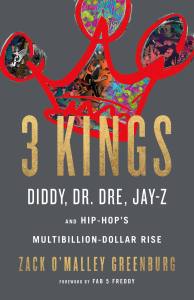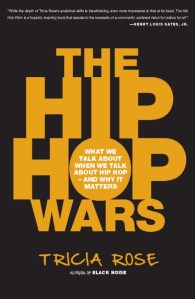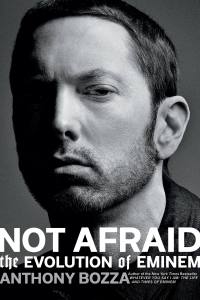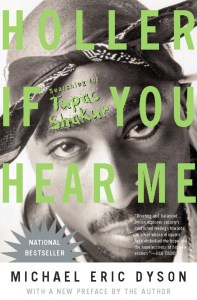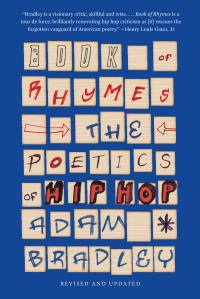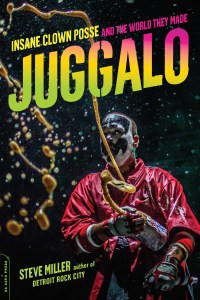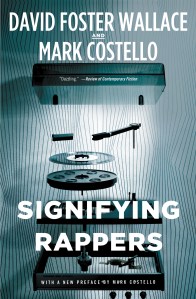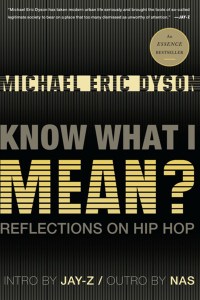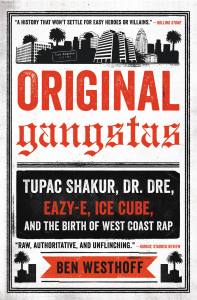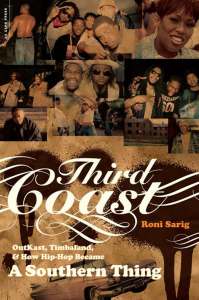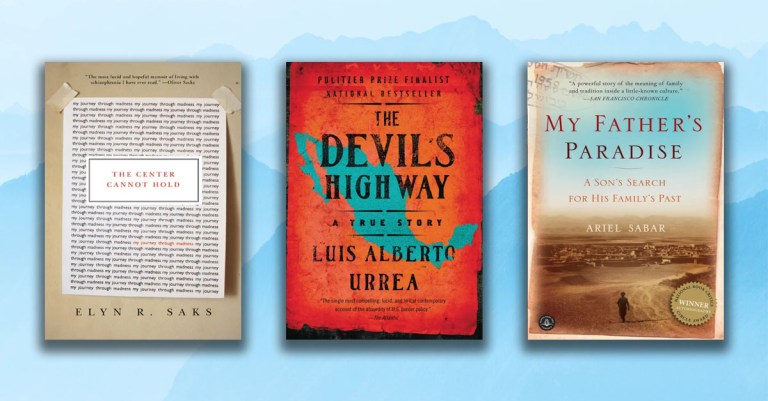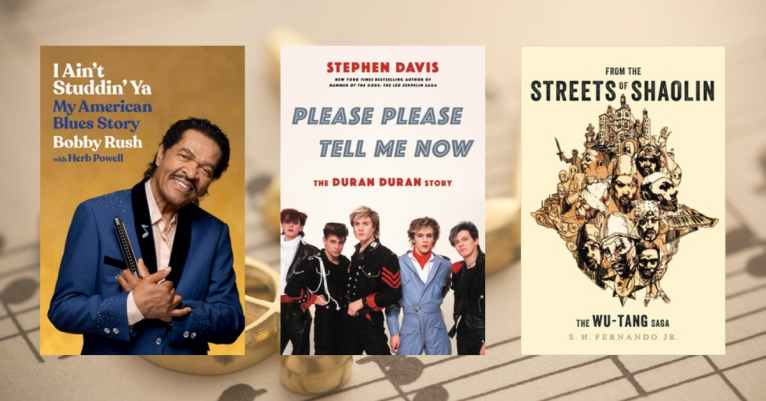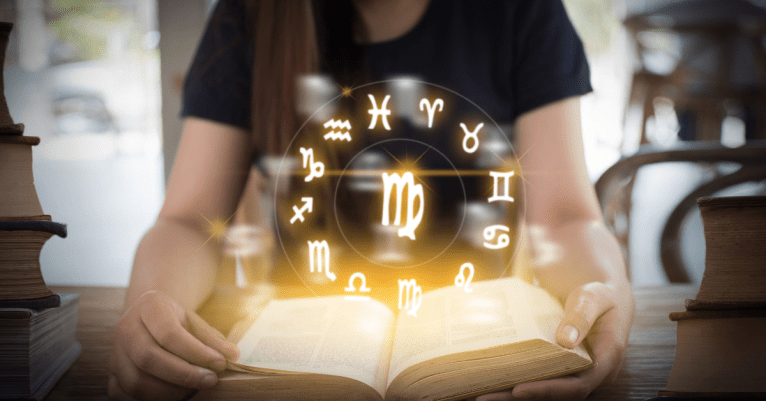Books for Rap, Hip Hop, and R&B Fans
Get a backstage pass to the lives and history of your favorite musicians, performers, and cultural icons.
Being successful musicians was simply never enough for the three kings of hip-hop. Diddy, Dr. Dre, and Jay-Z lifted themselves from childhood adversity into tycoon territory, amassing levels of fame and wealth that not only outshone all other contemporary hip-hop artists, but with a combined net worth of well over $2 billion made them the three richest American musicians, period.
Yet their fortunes have little to do with selling their own albums: between Diddy's Ciroc vodka, Dre's $3 billion sale of his Beats headphones to Apple, and Jay-Z's Tidal streaming service and other assets, these artists have transcended pop music fame to become lifestyle icons and moguls.
Hip-hop is no longer just a musical genre; it's become a way of life that encompasses fashion, film, food, drink, sports, electronics and more -- one that has opened new paths to profit and to critical and commercial acclaim. Thanks in large part to the Three Kings -- who all started their own record labels and released classic albums before moving on to become multifaceted businessmen -- hip-hop has been transformed from a genre spawned in poverty into a truly global multibillion-dollar industry.
These men are the modern embodiment of the American Dream, but their stories as great thinkers and entrepreneurs have yet to be told in full. Based on a decade of reporting, and interviews with more than 100 sources including hip-hop pioneers Russell Simmons and Fab 5 Freddy; new-breed executives like former Def Jam chief Kevin Liles and venture capitalist Troy Carter; and stars from Swizz Beatz to Shaquille O'Neal, 3 Kings tells the fascinating story of the rise and rise of the three most influential musicians in America.
Hip hop is a distinctive form of black art in America-from Tupac to the Pulitzer Prize-winning Kendrick Lamar, hip hop has long given voice to the African American experience. As scholar and cultural critic Tricia Rose argues, hip hop, in fact, has become one of the primary ways we talk about race in the United States.
But hip hop is in crisis. For years, the most commercially successful hip hop has become increasingly saturated with caricatures of black gangstas, thugs, pimps, and hos. This both represents and feeds a problem in black American culture. Or does it? In The Hip-Hop Wars, Rose explores the most crucial issues underlying the polarized claims on each side of the debate: Does hip hop cause violence, or merely reflect a violent ghetto culture? Is hip hop sexist, or are its detractors simply anti-sex? Does the portrayal of black culture in hip hop undermine black advancement?
A potent exploration of a divisive and important subject, The Hip Hop Wars concludes with a call for the regalvanization of the progressive and creative heart of hip hop. What Rose calls for is not a sanitized vision of the form, but one that more accurately reflects a much richer space of culture, politics, anger, and yes, sex, than the current ubiquitous images in sound and video currently provide.
"A passionate look at the Detroit rapper's music . . . an expert and thoughtful assessment." - Booklist
In 1999, a former dishwasher from Detroit named Marshall Bruce Mathers III became the most controversial and polarizing musical artist in the world. He was an outlier, a white artist creating viable art in a black medium, telling stories with such verbal dexterity, nimble wit, and shocking honesty that his music and persona resonated universally. In short, Eminem changed the landscape of pop culture as we knew it.
In 2006, at the height of his fame and one of the biggest-selling artists in music history, Eminem all but disappeared. Beset by nonstop controversy, bewildering international fame, a debilitating drug problem, and personal tragedy, he became reclusive, withdrawing to his Detroit-area compound. He struggled with weight gain and an addiction to prescription pills that nearly took his life. Over the next five years, Eminem got sober, relapsed, then finally got and stayed clean with the help of his unlikely friend and supporter, Elton John. He then triumphantly returned to a very different landscape, yet continued his streak of number one albums and multiplatinum singles.
Not Afraid picks up where rock journalist Anthony Bozza's bestselling Whatever You Say I Am left off. Capturing Eminem's toughest years in his own words, as well the insights of his closest friends and creative collaborators, this book chronicles the musical, personal, and spiritual growth of one of hip-hop's most enduring and enigmatic figures.
"In the tradition of jazz saxophonists John Coltrane and Charlie Parker, Dyson riffs with speed, eloquence, bawdy humor, and startling truths that have the effect of hitting you like a Mack truck."-San Francisco Examiner
"Such is the genius of Dyson. He flows freely from the profound to the profane, from popular culture to classical literature." -- Washington Post<br
"A major American thinker and cultural critic." -- Philadelphia Inquirer
"Among the young black intellectuals to emerge since the demise of the civil rights movement" -- undoubtedly the most insightful and thought-provoking is Michael Eric Dyson." -- Manning Marable, Director of African American Studies, Columbia University
Examining rap history's most memorable lyricists and their inimitable techniques, literary scholar Adam Bradley argues that we must understand rap as poetry or miss the vanguard of poetry today. Book of Rhymes explores America's least understood poets, unpacking their surprisingly complex craft, and according rap poetry the respect it deserves.
Author and journalist Steve Miller follows ICP across America, hanging out with Juggalos before and after shows, at the legendary annual Gathering of the Juggalos, and at work and home to share their stories. In addition, Juggalo dives deep into the FBI's misguided assault on Juggalo culture and the misidentification of this devoted group of horrorcore fans as a gang.
Juggalo is also the chronicle of two hard-luck kids from Detroit who created an empire and became the unwitting stars of a uniquely American grassroots success story. Without the help of radio airplay and with little love from the music industry establishment, ICP went platinum and fostered one of America's most durable subcultures.
Juggalo is required reading for the hardcore fan and pop culture buff alike, a scrupulously researched account of a subculture unlike any other -- one that so shook the establishment it launched a federal investigation -- as well as a window into the world of the Juggalos and the singular mythology of their underworld apocalypse.
.
Living together in Cambridge in 1989, David Foster Wallace and longtime friend Mark Costello discovered that they shared "an uncomfortable, somewhat furtive, and distinctively white enthusiasm for a certain music called rap/hip-hop."
The book they wrote together, set against the legendary Boston music scene, mapped the bipolarities of rap and pop, rebellion and acceptance, glitz and gangsterdom. Signifying Rappers issued a fan's challenge to the giants of rock writing, Greil Marcus, Robert Palmer, and Lester Bangs: Could the new street beats of 1989 set us free, as rock had always promised?
Back in print at last, Signifying Rappers is a rare record of a city and a summer by two great thinkers, writers, and friends. With a new foreword by Mark Costello on his experience writing with David Foster Wallace, this rerelease cannot be missed.
A monumental, revealing narrative history about the legendary group of artists at the forefront of West Coast hip-hop: Eazy-E, Dr. Dre, Ice Cube, Snoop Dogg, and Tupac Shakur.
Amid rising gang violence, the crack epidemic, and police brutality, a group of unlikely voices cut through the chaos of late 1980s Los Angeles: N.W.A. Led by a drug dealer, a glammed-up producer, and a high school kid, N.W.A gave voice to disenfranchised African Americans across the country. And they quickly redefined pop culture across the world. Their names remain as popular as ever -- Eazy-E, Dr. Dre, and Ice Cube. Dre soon joined forces with Suge Knight to create the combustible Death Row Records, which in turn transformed Snoop Dogg and Tupac Shakur into superstars.
Ben Westhoff explores how this group of artists shifted the balance of hip-hop from New York to Los Angeles. He shows how N.W.A.'s shocking success lead to rivalries between members, record labels, and eventually a war between East Coast and West Coast factions. In the process, hip-hop burst into mainstream America at a time of immense social change, and became the most dominant musical movement of the last thirty years. At gangsta rap's peak, two of its biggest names -- Tupac and Biggie Smalls -- were murdered, leaving the surviving artists to forge peace before the genre annihilated itself.
Featuring extensive investigative reporting, interviews with the principal players, and dozens of never-before-told stories, Original Gangstas is a groundbreaking addition to the history of popular music.
What to Read Next
By clicking ‘Sign Up,’ I acknowledge that I have read and agree to Hachette Book Group’s Privacy Policy and Terms of Use
